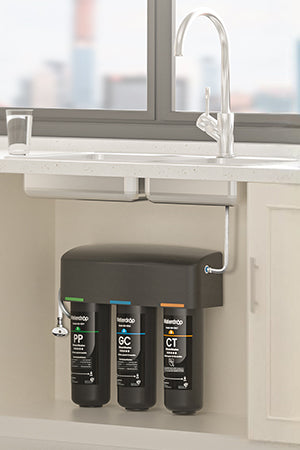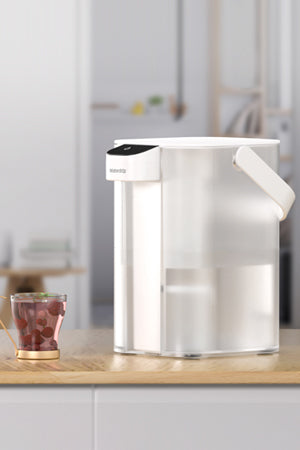Caring for your health means getting regular blood tests. Before taking a sample, doctors often ask patients to fast, which means that the patient must refrain from eating (or drinking) for a certain amount of time.
However, one of the most common questions people have is whether it's okay to drink water before a blood test. Yes, you can absolutely drink water before a blood test. Keep reading to learn about the impact of water on blood test results and receive advice to stay informed.
Why Is Fasting Required Before a Blood Test?
In order to get accurate results, fasting before certain blood tests is a must. When your body is processing food or drink, it can influence the levels of different substances in your blood, like glucose, cholesterol, or lipids.
This is especially true when you're getting these tests:
-
Blood Glucose Test : You'll get this test to check for diabetes or monitor blood sugar levels.
- Lipid Profile: This test measures cholesterol and triglyceride levels to assess cardiovascular risk.
- Liver Function Tests: Liver enzyme readings can really be impacted by eating or drinking.
Can I Actually Drink Water Before a Blood Test?
You can absolutely drink water before a blood test. In many cases, it's actually encouraged!
Because it's calorie and nutrient-free, water does not impact the results of a fasting blood test. When you are properly hydrated, it's easier for the technician to draw blood – this helps your veins become more accessible and visible, making the process smoother for everyone.
Here's why hydration can help with blood testing:
- Water helps maintain a healthy blood volume, allowing blood to flow more easily.
- It can make veins more prominent, which actually reduces discomfort during the procedure.
- It also prevents dehydration, which affects your overall health and the accuracy of the test.
What About Other Drinks Before a Blood Test?
It's a good idea to
avoid other drinks , such as coffee, tea, and soda, before a blood test, especially if they contain caffeine, sugar, or artificial sweeteners. Here's how they can interfere with test results:
Coffee and Tea
Although they are calorie-free, caffeine can affect certain tests. For example, caffeine will likely raise your blood pressure, which could change your results for cardiovascular-related blood tests.
Juice
Fruit juices, even without added sugar, contain natural sugars that raise your blood sugar levels and skew test results.
Soda and Alcohol
Soft drinks have high sugar content, raising your glucose levels, and alcohol impacts liver function test results.
Most doctors agree that drinking water before a blood test is acceptable, but it's essential to stick to plain water. Drinking water before a blood test is beneficial and will not affect the results, as long as you avoid any beverages with calories or added sugars. Staying hydrated also helps prevent fainting or dizziness during the blood draw.
Can Drinking Water Impact Test Results?
Most of the time, water consumption will not significantly impact your blood test results. On the other hand, keep these elements in mind:
Too Much Water
If you
drink excessive amounts of water before a test, it might dilute your blood. While this is only true in extreme cases, it can lead to inaccurate results for certain markers, such as sodium levels.
Water with Additives
Some flavored waters or electrolyte drinks have added sugars, sodium, or caffeine. You should avoid these since they can interfere with the test results.
Fasting Period
If your doctor has specifically instructed you to fast for a specific period (such as 12 hours), follow their instructions precisely. While water is generally safe, be sure to check with your healthcare provider if you don't know the details of your fasting instructions.
How Much Water Is Safe to Drink Before a Blood Test?
When drinking water before a blood test, it's best to do so in moderation. In general, drinking between 8 and 16 ounces (1 to 2 cups) of water in the morning before your blood test is perfectly fine to stay hydrated without overdoing it.
Keep in mind that you should avoid drinking excessive amounts of water because that can make your veins more difficult to access, and in some rare cases, impact the balance of electrolytes in your body.
What If I Can't Drink Water Before My Blood Test?
Depending on the test, some doctors may ask you not to drink anything at all before a blood test. This is especially true if you're going through a test that requires you to be in a completely fasted state. This is most commonly for tests like:
- Cholesterol and triglyceride tests (which is a lipid profile)
- Fasting glucose levels (for diabetes testing)
In these situations, follow the fasting instructions as strictly as possible. This means avoiding water if needed to get accurate results.
Common Myths About Drinking Water Before Blood Tests
Let's clear up a few common misconceptions about drinking water before a blood test:
Myth 1: Drinking water makes me "too full" to fast properly
Fact: Water is calorie-free, and drinking it won't actually break your fast. It will only make you more hydrated, so taking blood is easier.
Myth 2: Drinking water will alter my test results
Fact: Water does not have calories or nutrients that would impact your blood test results, in most cases. On the other hand, you should avoid beverages with calories, caffeine, or artificial additives.
Myth 3: I should avoid drinking any water before a blood test
Fact: As long as you're drinking plain water, it can actually help with the blood test process since it helps you stay hydrated.
The Takeaway
Drinking water won't interfere with the results of your test, and in most cases, it's actually encouraged. Hydration can help make the blood draw process easier for the nurse and more comfortable for you. But be sure to avoid other drinks with calories, caffeine, or artificial sweeteners – these can skew your test results!
Follow your doctor's instructions closely before a blood test to ensure the most accurate results. Don't know what you can drink before a test? Call your healthcare provider to find out!





































































